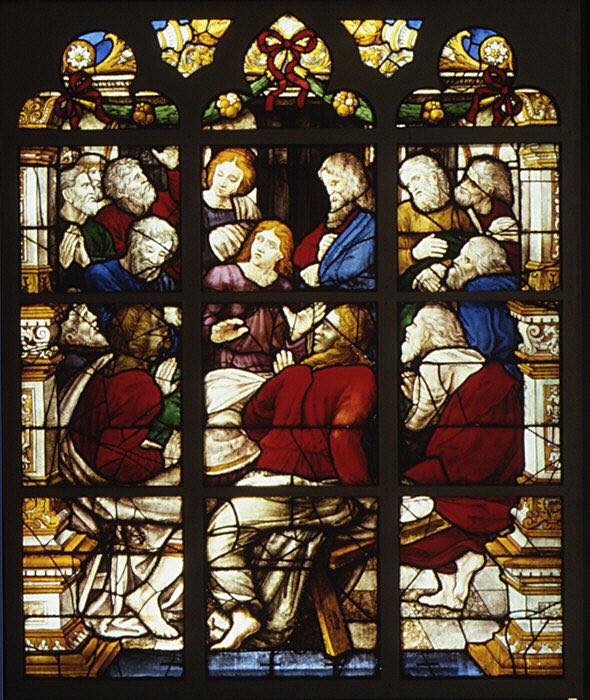
Picture a group of men sitting in a tiny upstairs room on a dark night, a few hours before their world is turned upside down. Maybe they even feel that it’s turning. Certainly their leader knows. And he’s giving them these mysterious instructions about betrayal and his leaving them to “enter into his glory” and they are clueless. Then he gives them what he calls a “new commandment”. The leader says this, “Love each other. Just as I have loved you, you should love each other. Your love for one another will prove to the world that you are my disciples.”
So it takes a bit of time and adjustment, but eventually, with some outside help from “the advocate”, they get it and their little tiny crew grows to countless numbers or groups. Even in the midst of adversity and hate, the ekklesia movement raged on to change the face of the world, and apparently, it was sparked by the love that each member had for one another.
Have you ever been to a Christian online community and thought to yourself, “Wow, the love here is for real!” Or better yet, have you ever had the privilege of searching for a church? Maybe you’ve moved or had a hard break (or even an easy one) and so you venture out into the online world, which is certainly a step up from the yellow pages of the 80’s and 90’s. You look for a review, a web site, and maybe a YouTube video, and then at that particular time, you venture out.
Now here’s where the system is broken. You no doubt walk into the building with your “judge eyes” on and you rate everything. How is the atmosphere when I walk in? Were the people friendly, but not desperate to have our family there? Is the coffee from Starbucks? Is the music God’s music from 18th century Europe, a blended mix of southern gospel and 1990’s choruses, or the newest raging pop rock from our fellow Christian brothers and sisters down under? Do I like what the male pastor is saying from the stage? Was he truthful enough? Did he make me feel good about the Bible? How was his communication flow?
And your checklist is different than mine, because you are different than me. As of now, however, and maybe for years now, we’ve settled on a church based on what we like or don’t like. I know, I know, some of you will tell me that you intellectually based your decision(s) on whether or not the pastor had a strong grasp on the world of God, and that too, is what you like or don’t like.
Then the church, for its part, is not necessarily worried about whether or not its particular body is loving one another or not because they need the Sunday morning service/experience/mass/
This is all quite different than what that leader, Jesus of Nazareth, commanded his disciples that they were to be known by. But it is in line with the one particular disciples answer to that commandment. In response to what Jesus said, Peter goes back to an earlier topic that focused on Jesus. “Lord, where are you going?” (John 13). This makes a lot of sense, especially if you don’t want the focus to be on you. “Jesus, I appreciate that commandment, but before all that talk about how I am called to act, let’s talk about you.”
On the surface, it seems unselfish and like something a good follower of Jesus would ask. We love to make our decisions because of “what God wants us to do”. So Jesus, we’ll get to how I should act in a second, but first, let’s (piously) talk about you.” Then ironically, we never get around to talking about us. Not till much later in the game, and only if we feel very very comfortable with the people around us. By the time that happens, we very well might be on to a new community.
Here’s the problem. Jesus’ command gives us a fool proof method to connect with other disciples and to show the world how to be his “bride”. Do they love one another or not?
Do you see the broken system yet? It’s the “institutional church’s” fault and it’s your fault. We’ve settled for Peter’s question and ignored Jesus command. We’ve decided our churches should be all about God, and God wanted our churches to be all about each other. Not worshiping each other, but genuinely loving one another.
And do you know why? Because Jesus knew if you want to know if someone really does love God, and you look at their temple or their piety or how well they know the Bible or how good they are at playing worship music, you are in for a big problem. But if you look at how much they love one another, and how they genuinely treat each other, putting others first, you will be able to see clear as day what a sharp website and flashy marketing can never tell you.
When you are a follower of Jesus in the wilderness, before you choose a church, don’t settle for how it feels or how much you like this or that, no matter what your preferences are, but ask yourself, “Do these people who claim to know God and follow His commands really love one another?” Because if not, they might have amazing potluck dinners, but in the end you’ll have a bad case of heart burn.




